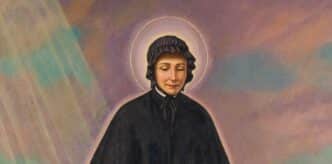Rarely is a saint’s wisdom as universally accepted as that of modern holy woman Teresa of Calcutta. During her lifetime, her work serving the poorest of the poor was extolled by people both within and without the Catholic Church, as evidenced by her reception of the Presidential Medal of Freedom, India’s Padma Shri award and the Nobel Peace Prize, among other honors. Many of her sayings resonated with her contemporaries and have since found their way — often in paraphrased form — onto T-shirts, tote bags and mugs for the next generation.
Perhaps some of this broad appeal is because the light of Christ shone through how she spoke and what she did even when she wasn’t explicitly calling on Catholic dogma. To put it another way, her expressions about peace and love were something most people, regardless of their faith, could get behind. For example: “If you want world peace, go home and love your family.” “Peace begins with a smile.” “If you can’t feed a hundred people, then feed just one.” Anyone who has seen a photo or video of this woman knows the brilliance of her smile, the tremendous peace that radiated from her petite 5-foot frame.
Shadows lengthen
Teresa was already a teacher and a fully vowed Sister of Loreto when, on a train ride to a retreat, she heard Christ implore her to “Come be my light” and quench the thirst of those on the margins of society. This experience, which she later referred to as her “call within a call,” led her to Calcutta. Little did she know that when she answered this call, she would enter into a decades-long period of interior darkness.
After St. Teresa died in 1997, the public learned that for most of her ministry, she struggled with what might have been diagnosed as depression. Even as she served the sick and dying, even as she established the Missionaries of Charity — a religious order with branches for sisters, brothers, priests and lay people — she experienced a sense of separation from the Lord. Father Brian Kolodiejchuk, postulator of St. Teresa’s cause of canonization, explains in “Come Be My Light: The Private Writings of the Saint of Calcutta” that the saint endured “profound interior suffering, lack of sensible consolation, spiritual dryness, an apparent absence of God from her life, and at the same time, a painful longing for him.”
Prisms of Christ’s light
It is usually in light of our weaknesses, rather than because of our strengths, that we deepen our relationship with God. When we struggle and then humbly admit that we need help, we make space for the Lord to work in our lives. St. Paul wrote of this kind of experience in his second letter to the Corinthians: “I will boast all the more gladly of my weaknesses, so that the power of Christ may dwell in me. Therefore I am content with weaknesses, insults, hardships, persecutions, and calamities for the sake of Christ; for whenever I am weak, then I am strong” (2 Cor 12:9-10).
St. Teresa trusted in the light of Christ even when she didn’t feel it herself. When we unite our will with God’s, as she did, we allow his light to shine through us. In such a communion, more often than not, we will find that we are capable of more love than we could have imagined on our own.








